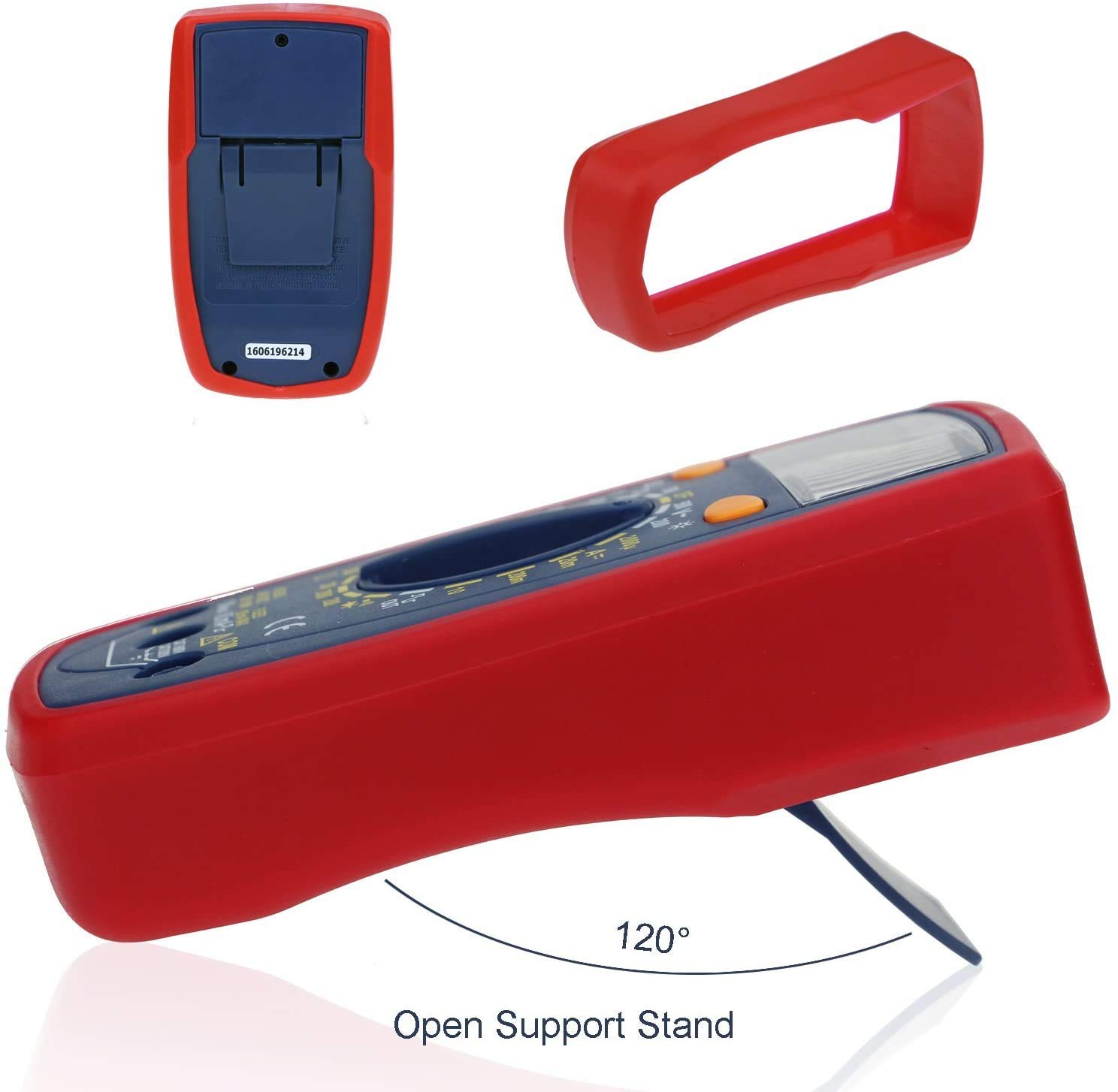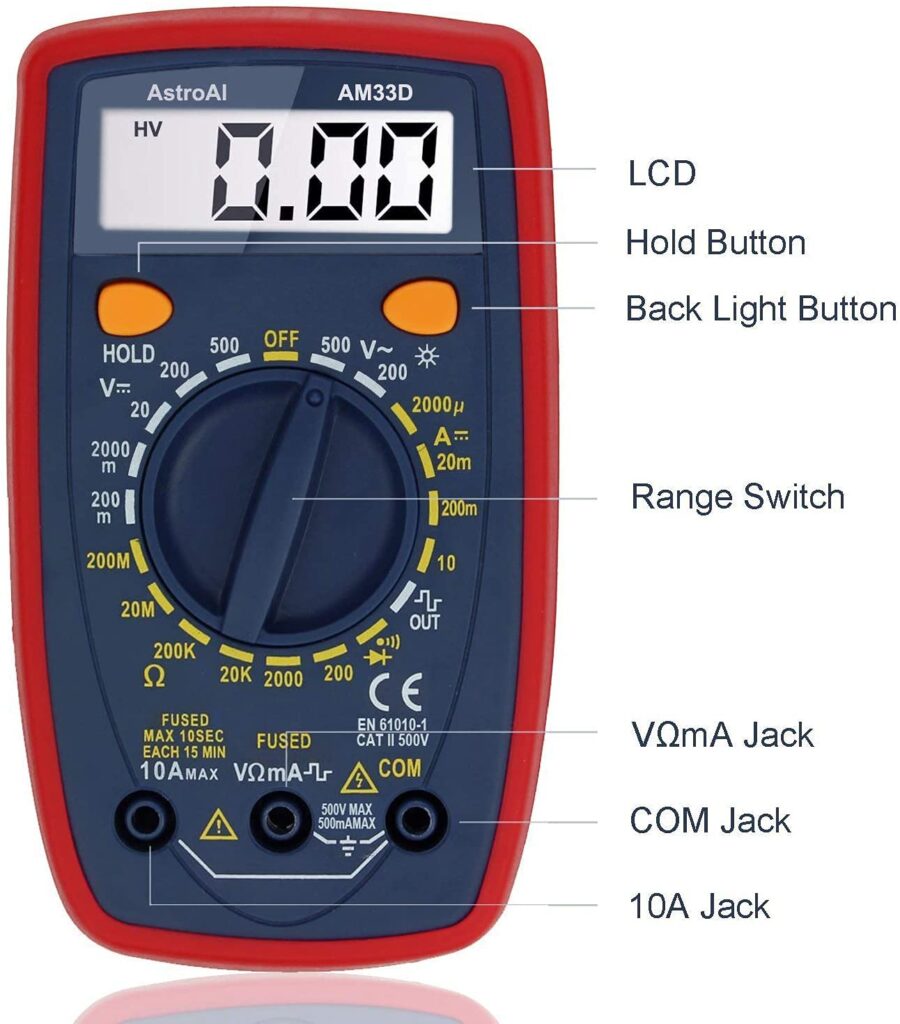Discover the benefits of sweatbands for your fitness routine. Enhance your performance and stay comfortable with these stylish and functional accessories.


Welcome to our comprehensive guide on multimeter testers. In this article, we will explore the various aspects of multimeter testers, including their functions, types, and how to choose the right one for your needs. Whether you are a professional electrician or a DIY enthusiast, a multimeter tester is an essential tool that can help you measure voltage, current, and resistance in electrical circuits. Let’s dive in and discover everything you need to know about multimeter testers.
A multimeter tester, also known as a digital multimeter (DMM), is a versatile tool used for measuring electrical quantities such as voltage, current, and resistance. It combines multiple functions into a single device, making it convenient and efficient for troubleshooting electrical problems. testers are commonly used in various fields, including electronics, automotive, and electrical engineering.
A multimeter tester can perform several functions, making it a versatile tool for electrical measurements. Here are the main functions of a tester:
A multimeter tester can measure direct current (DC) voltage and alternating current (AC) voltage. It allows you to determine the voltage level in a circuit, which is crucial for troubleshooting electrical issues and ensuring the proper functioning of electrical devices.
With a multimeter tester, you can measure both DC and AC current. This function helps you determine the amount of current flowing through a circuit, which is essential for diagnosing faults and ensuring the safety of electrical systems.
A multimeter tester can measure the resistance of a component or a circuit. This function is useful for checking the integrity of resistors, identifying faulty components, and troubleshooting electrical problems related to resistance.
Continuity testing is a feature available in most testers. It allows you to check if a circuit is complete and if there is a continuous path for the flow of current. This function is helpful for identifying open circuits or faulty connections.
Some multimeter testers have a diode testing function, which enables you to test the functionality of diodes. It helps you determine if a diode is functioning correctly or if it needs to be replaced.
Advanced testers offer capacitance measurement capabilities. This function allows you to measure the capacitance of capacitors, which is essential for diagnosing faulty capacitors and ensuring the proper functioning of electronic devices.
Some multimeter testers come with a built-in temperature sensor or support external temperature probes. This feature allows you to measure temperature in various applications, such as HVAC systems, automotive diagnostics, and electronic testing.

There are several types of testers available in the market, each designed for specific applications and user requirements. Let’s explore the different types of multimeter testers:
Analog multimeter testers use a mechanical movement to display measurements. They have a rotating needle that indicates the measurement value on a scale. Analog multimeters are known for their simplicity and reliability. They are suitable for basic measurements and are often preferred by hobbyists and beginners.
Digital multimeter testers use digital displays to show measurement values. They offer higher accuracy and precision compared to analog multimeters. Digital multimeters are equipped with microprocessors that convert analog signals into digital readings. They are more versatile and commonly used by professionals in various industries.
Clamp testers, also known as clamp meters or current clamps, are specialized multimeters designed for measuring current without breaking the circuit. They have a hinged jaw that can be clamped around a conductor to measure the current flowing through it. Clamp multimeters are commonly used in electrical and HVAC applications.
Automotive multimeter testers are specifically designed for diagnosing electrical systems in vehicles. They have additional features and measurement ranges tailored for automotive applications. Automotive multimeters can measure voltage, current, resistance, and other parameters relevant to automotive diagnostics.
Benchtop testers are larger and more advanced multimeters used in laboratory and industrial settings. They offer high accuracy, precision, and a wide range of measurement capabilities. Benchtop multimeters often come with additional features such as data logging, waveform analysis, and advanced connectivity options.

When selecting a multimeter tester, it’s essential to consider your specific needs and requirements. Here are some factors to consider when choosing the right tester:
Ensure that the multimeter tester you choose has an appropriate measurement range for the parameters you intend to measure. Additionally, consider the accuracy of the multimeter tester, as higher accuracy is crucial for precise measurements.
Look for multimeter testers with safety features such as overload protection, fused inputs, and CAT (Category) safety ratings. These features ensure that you can safely work with electrical systems and protect yourself from potential hazards.
Consider the type of display and user interface that suits your preferences and ease of use. Digital multimeters typically have LCD displays, while analog multimeters have mechanical needle displays. Choose a display that is clear, easy to read, and provides the necessary information.
Depending on your specific needs, look for testers with additional features such as data logging, peak hold, auto-ranging, and connectivity options. These features can enhance your productivity and make your measurements more efficient.
Set a budget for your tester and consider the price range of the available options. While it’s crucial to invest in a quality multimeter tester, ensure that it aligns with your budget and provides the necessary features for your requirements.
Here are some tips to help you effectively use a tester:
Before using your multimeter tester, thoroughly read the user manual to understand its functions, features, and safety precautions. Familiarize yourself with the controls and settings to ensure accurate and safe measurements.
Always select the appropriate measurement range for the parameter you are measuring. Using the wrong range can result in inaccurate readings and potential damage to the tester.
Before using the tester for critical measurements, perform a quick self-test to ensure its proper functioning. This can be done by testing a known voltage source or using the provided calibration features.
Ensure that you are using the correct probes and leads for your measurements. Different applications may require different types of probes, such as alligator clips, needle probes, or temperature probes. Using the right probes will ensure accurate and reliable measurements.
Always follow safety precautions when working with electrical systems. Use personal protective equipment, such as insulated gloves and safety glasses. Ensure that the circuit you are measuring is de-energized before making any connections.
Learn and practice proper measurement techniques to ensure accurate readings. This includes proper probe placement, avoiding contact with live conductors, and minimizing interference from nearby electrical sources.

– Versatility: Multimeter testers can perform multiple functions, making them a versatile tool for electrical measurements.
– Ease of Use: testers are generally easy to use, with intuitive controls and clear readings on the display.
– Time-saving: Having a multimeter tester on hand allows for quick troubleshooting and diagnosis of electrical issues, saving both time and effort.
– Cost-effective: testers are relatively affordable compared to other specialized electrical testing equipment.
– Portable: Most testers are compact and lightweight, making them easy to carry around for on-site measurements.
– Learning Curve: Using a tester effectively may require some learning and practice, especially for beginners.
– Limited Functionality: While multimeter testers offer multiple functions, they may not have the advanced features and capabilities of specialized testing equipment.
– Lower Accuracy: Analog testers may have slightly lower accuracy compared to digital testers.
– Fragility: Some multimeter testers may be more prone to damage from rough handling or accidental drops.
– “I’ve been using my tester for years and it’s been a reliable tool for all my electrical work. It’s easy to use and provides accurate readings.” – John D.
– “I recently bought a digital tester and it has been a game-changer for troubleshooting electrical issues in my workshop. It’s so much faster and more accurate than my old analog meter.” – Sarah M.
– “I love my clamp tester. It’s perfect for measuring current without needing to disconnect any wires. Highly recommend it for electricians and HVAC technicians.” – Mike T.
– “I bought a budget-friendly tester and it has served me well for basic measurements around the house. Great value for the price.” – Emily L.
Yes, most multimeter testers have the ability to measure both AC and DC voltage.
To test continuity, set your tester to the continuity mode and touch the probes together. If you hear a beep or see a visual indication, it means that there is continuity, indicating a complete circuit.
Not all multimeter testers have temperature measurement capabilities. You will need to check the specifications of the specific tester you are considering to see if it includes temperature measurement.
When using a tester, always follow these safety precautions:
– Ensure the circuit is de-energized before making any connections.
– Use personal protective equipment, such as insulated gloves and safety glasses.
– Avoid touching live conductors.
– Be cautious of nearby electrical sources that may interfere with your measurements.
It is generally recommended to measure resistance in de-energized circuits. Measuring resistance in live circuits can be challenging and may yield inaccurate readings.

In conclusion, a tester is an essential tool for anyone working with electrical systems. It offers various functions such as voltage measurement, current measurement, resistance measurement, and continuity testing. Multimeter testers come in different types, including analog, digital, clamp, automotive, and benchtop. When choosing a tester, consider factors such as measurement range, accuracy, safety features, display, additional features, and budget. While testers have pros such as versatility and portability, they may have cons such as a learning curve and limited functionality. Overall, a tester is a valuable tool for accurately measuring electrical quantities and troubleshooting electrical issues.
Multimeter testers are essential tools for anyone working with electrical systems. They provide accurate measurements of voltage, current, and resistance, allowing users to diagnose electrical faults and ensure the proper functioning of electrical devices. By understanding the functions, types, and considerations for choosing the right tester, you can make an informed decision and effectively use this versatile tool in your electrical work.
Multimeter testers are essential tools for anyone working with electrical systems. They provide accurate measurements of voltage, current, and resistance, allowing users to diagnose electrical faults and ensure the proper functioning of electrical devices. By understanding the functions, types, and considerations for choosing the right multimeter tester, you can make an informed decision and effectively use this versatile tool in your electrical work.